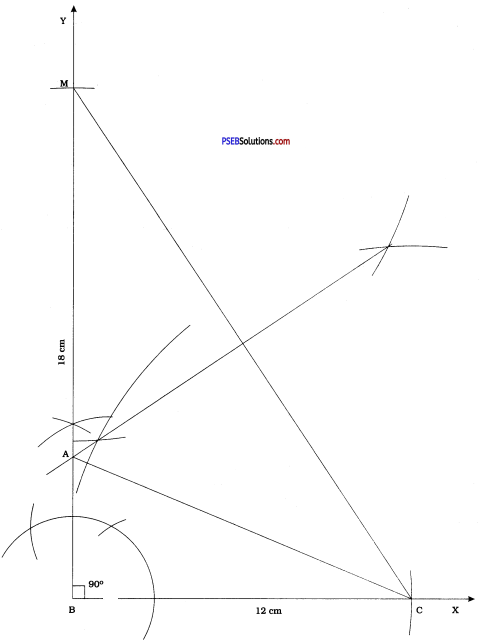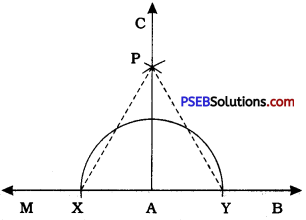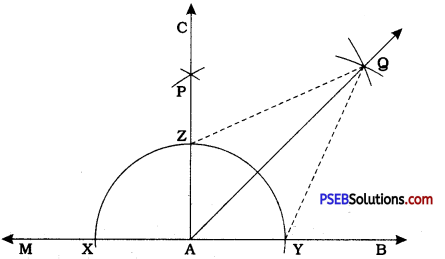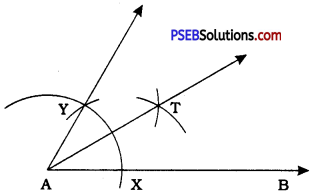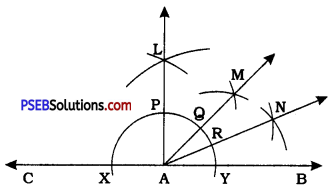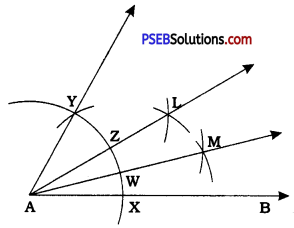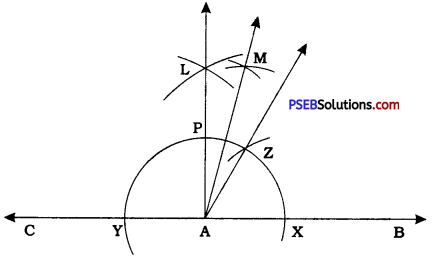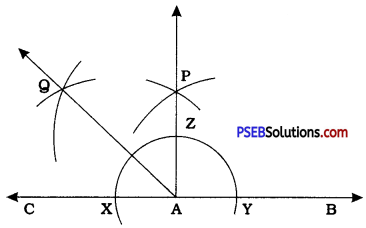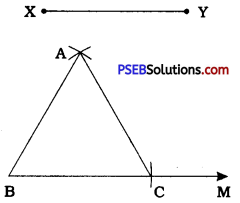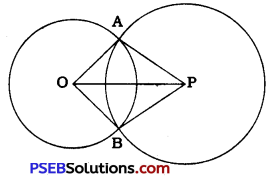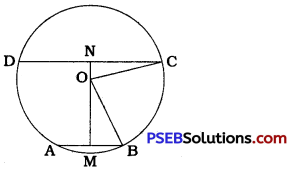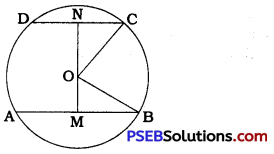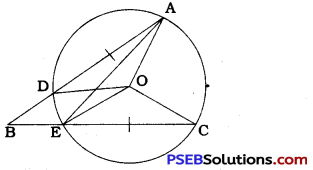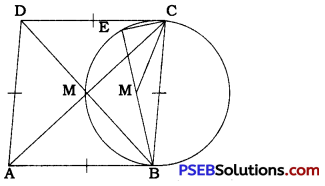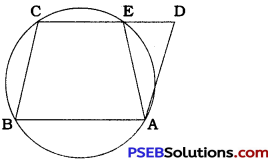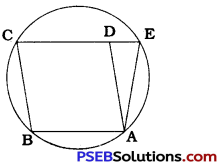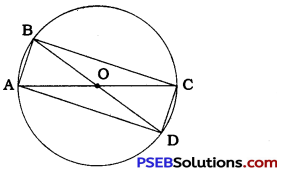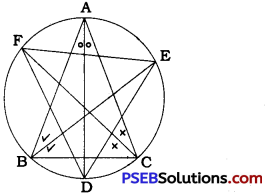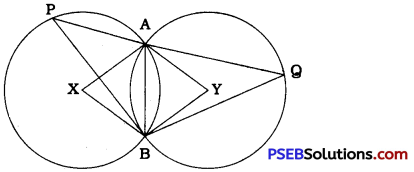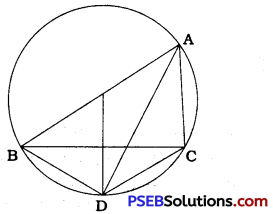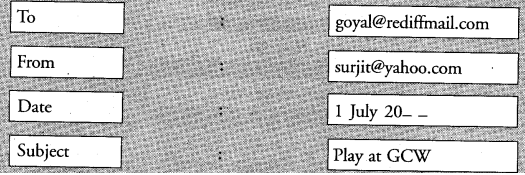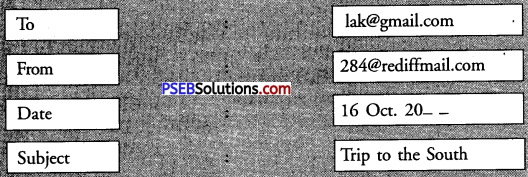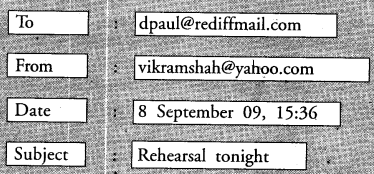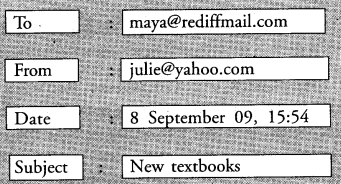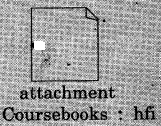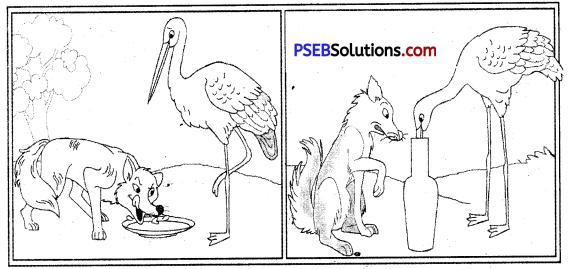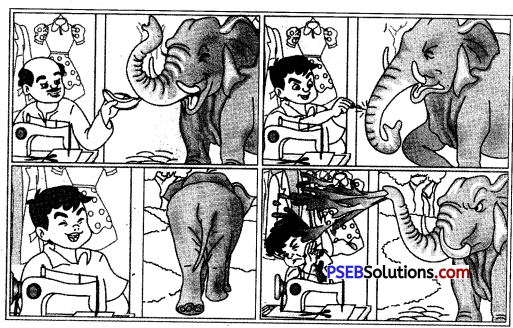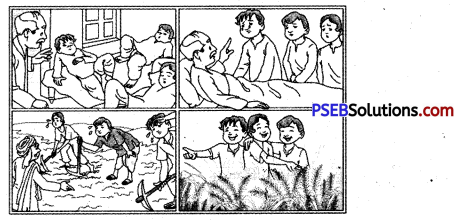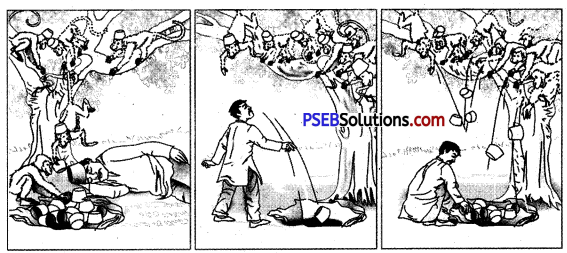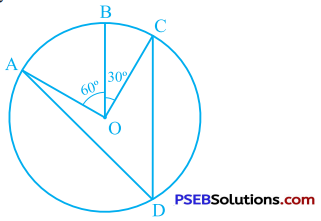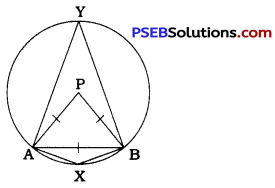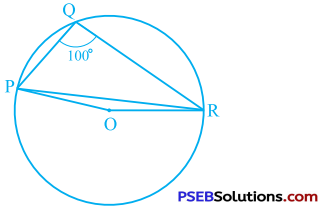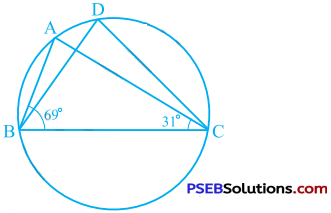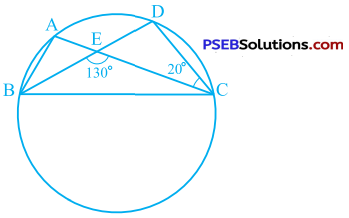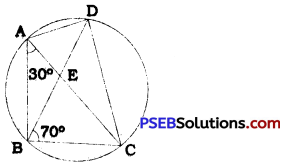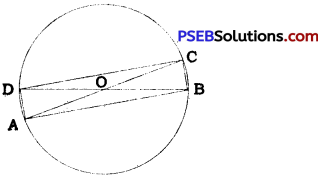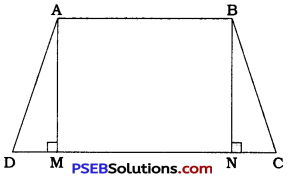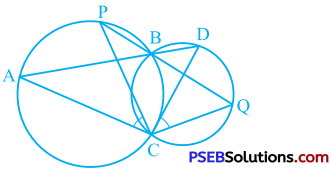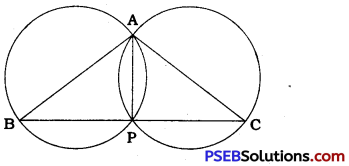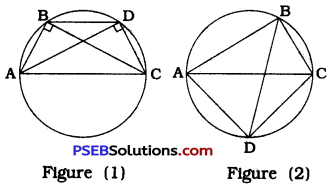Punjab State Board PSEB 9th Class English Book Solutions English Reading Comprehension Unseen Passages Exercise Questions and Answers, Notes.
PSEB 9th Class English Reading Comprehension Unseen Passages
(A) Passages From Grammar Book Note :
- In all the passages, questions have been changed according to new Pattern of Testing.
- Answers have been given at the end of this set.
Passage 1
During the winter of 1945, I lived for several months in a house in Brooklyn. It was not a shabby place, but a pleasantly furnished one. It was well-kept by its owners – two elderly sisters. Mr. Jones lived in the room next to mine. My room was the smallest in the house, his the largest, a nice big sunshiny room, which Mr. Jones never left. All his needs meal, shopping, laundry? – were attended to by the middle-aged landladies.
Also, he was not without visitors; on an average, half-dozen various persons, men and women, young and old, in-between visited him from early morning till late in the evening. He was not a drug dealer or a fortune-teller“; no, they just came to talk to him and apparently they made him small gifts of money for his conversation and advice. If not, he had no obvious? means to support himself. I never had a conversation with him, because I was out most of the time. He was a handsome man about forty.

Slenders, black-haired and with distinctive face; a pale, lean face, high cheek bones, and with a birthmark on his left cheek. He wore gold-rimmed glasses with black lenses, for he was blind and cripple too. He was always dressed in pressed dark grey or blue three-piece suit and a light coloured tie — as though he was to set off for work.
Choose the correct option to answer each question :
Question 1.
Jones earned his living by …………
(a) selling drugs.
(b) telling future
(c) giving advice to people
(d) by working in farms.
Answer:
(c) giving advice to people
Question 2.
Mr. Jones was looked after by ……………
(a) the landladies
(b) the visitors
(c) the author
(d) the landlords.
Answer:
(a) the landladies
Question 3.
……….. came to visit Mr. Jones.
(a) Old people
(b) Young people
(c) Poor people
(d) People of all ages.
Answer:
(d) People of all ages.

Question 4.
What did the landladies do for Mr. Jones ?
(a) They prepared meals for him.
(b) They did shopping for him.
(c) They washed his clothes.
(d) All of these three.
Answer:
(d) All of these three.
Question 5.
Mr Jones had a birthmark on his ………
(a) left ear
(b) right ear
(c) left cheek
(d) right cheek.
Answer:
(d) right cheek.
Passage – 2
Yehudi Menuhin moved from Highgate into his early 19th century house in London’s Belgravia last July but has only lived in it for a couple of months. Born in 1917, the famous? violinist and conductor, who first began his public career at the age of seven in San Francisco, still spends nine months of the year on tour. His room is four storeys up on the top floor and a lift was waiting for us in the front hall. His wife greets us and we find the maestro waiting for us on the landing.
He leads the way up a further flight of polished wooden stairs to his studio. “This is my room and I absolutely love it.’ The idea is that the studio should look like a ship. Its walls are covered with pinewood and natural light comes in through the windows in the roof. On the floor, there are cotton rugs which were made in central Asia. The whole of one wall is covered with letters in frames, paintings and prints, mostly collected by his wife Diana. ‘Anything I have of beauty or value was given to me by my wife, including herself.’ He doesn’t like empty surfaces.
“I need many tables. The card table proves his point, with its neat rows of objects standing around a figure that was found in the Athens antique market. The grand piano belonged to Menuhin’s mother-in-law, who was a brilliant pianist. Rows of photographs are displayed on top. An Indian string instrument lying by the window contrasts with the record player and tape deck nearby:
Choose the correct option to answer each question :
Question 1.
Where does Yehudi Menuhin live ?
(a) London.
(b) Canada.
(c) Belmont
(d) New York
Answer:
(a) London.

Question 2.
Which instrument does he play?
(a) Piano.
(b) Guitar.
(c) Violin.
(d) Flute.
Answer:
(c) Violin.
Question 3.
When Menuhin was only seven years old …..
(a) he went to San Franciso.
(b) he performed for the public for the first time.
(c) both (a) and (b).
(d) neither (a) nor (b).
Answer:
(c) both (a) and (b).
Question 4.
The walls of Yehudi’s studio are covered with
(a) plaster.
(b) wall paper.
(c) pinewood.
(d) paintings.
Answer:
(c) pinewood.
Question 5.
Who does a brilliant pianist refer to ?
(a) Yehudi’s mother.
(b) Yehudi’s mother-in-law.
(c) Yehudi’s wife.
(d) Yehudi Menuhin.
Answer:
(b) Yehudi’s mother-in-law.
Question 6.
What does the word ‘antique’ mean?
(a) old and valuable
(b) old and cheap
(c) new and valuable
(d) new and cheap.
Answer:
(a) old and valuable

Passage – 3
What kind of car will we be driving in 2030 ? Rather different from the type we know today, with the next 10 years bringing greater change than the past 50. The people who will be designing the models of tomorrow, believe that environmental problems may well accelerate the pace of the car’s development. Today, they are students of the transport design course at London’s Royal College of Art.
Their visions is of a machine with three wheels instead of four, electrically powered, environmentally clean, and able to drive itself along ‘intelligent’ roads with built-in power supplies. Future cars will pick up their fuel during long journeys from a power source built into the road, or store it in small quantities for travelling in the city.
Instead of today’s seating arrangement – two in front, two or three behind, all facing forward the 2010 car will have a different design with adults and children sitting in a family circle.
This view of the future car is based on a much more sophisticated” road system, with strips built into motorways to supply power to vehicles passing along them. Cars will not need drivers, because computers will provide safe driving control and route finding. All the driver will have to do is, say where to go and the computer will do the rest. It will become impossible for the cars to crash into one another. The technology already exists for the car to become a true automobile?.
Choose the correct option to answer each question :
Question 1.
Why will the new cars be developed ?
(a) Because of the fuel problems of today.
(b) Because of the traffic problems of today.
(c) Because of the environmental problems of today.
(d) None of these three.
Answer:
(c) Because of the environmental problems of today.
Question 2.
Who is going to develop them?
(a) The students of Belmont’s Royal College of Art.
(b) The students of London’s King College of Art.
(c) The students of Belmont’s King College of Art.
(d) The students of London’s Royal College of Art.
Answer:
(d) The students of London’s Royal College of Art.

Question 3.
How will the future cars be different from the present ones?
(a) They will cause no problem.
(b) They will be driven by computers.
(c) They will require no fuel.
(d) Any of the above.
Answer:
(b) They will be driven by computers.
Question 4.
How will the driving of cars become safer and easier in the 2030 ?
(a) Because the cars will be driven by computers.
(b) Because of the advanced road system.
(c) Because there will be less traffic on the roads.
(d) Because the people will obey the traffic rules.
Answer:
(a) Because the cars will be driven by computers.
Question 5.
The future cars will leave the environment clean. How ?
(a) They won’t cause any traffic problem.
(b) They won’t cause any noise pollution.
(c) They won’t give out any fumes.
(d) All of the above.
Answer:
(c) They won’t give out any fumes.
Question 6.
The word ‘supply’ in para 3 means ………
(a) provide
(b) allow
(c) support
(d) refuse.
Answer:
(a) provide
Passage 4
Tokyo is an ugly city. There are hardly any beautiful or even good buildings; there are very few parks; there are no mountains or even hills inside or outside the city; there is no green belt; there are few monuments worth looking at; the air pollution is terrifying; the perpetual noise deafening; the traffic murderous.
But not all is ugliness in Tokyo. There are a few good buildings and impressive? temples and shrines; there are a few parks worth visiting. And the overcrowding, the lack of space, has one advantage, pleasing at least to the eye. Everything has to be small in Tokyo; houses, rooms, shops – even, one feels, people, to fit into the small houses. Long side-streets consist of tiny houses only, and this often creates a toy-like, unreal quality, with small women tiptoeing along in their kimonos and equally small men sitting, motionless, inside their tiny shops.

Tokyo at night is a very different place from Tokyo in daytime. After the offices have closed and commuters have left the town, Tokyo puts on a new face. Millions of neon signs are switched on. At cafes, bars and nightclubs, sushi-places, yakitoriya, Chinese restaurants and theatres, cinemas, and many other places, this wild nightlife goes on and on and on – until 10.30 at night. Some nightclubs stay open till much later. By 11 p.m. (earlier on Sundays) all the gaiety is over, everyone is at home and in bed.
A town is not its buildings alone, it is an atmosphere, its ambience“, its feel, its pleasures, its sadness, its madness, its disappointments and above all its people. Tokyo may lack architectural beauty but it has character and excitement; it is alive. I found it a mysterious and lovable city.
Choose the correct option to answer each question :
Question 1.
Which characteristics goes against Tokyo ?
(a) There are very few parks.
(b) There are no green belts.
(c) There are no mountains or hills.
(d) All of these there.
Answer:
(d) All of these there.
Question 2.
Tokyo looks beautiful only ………..
(a) at night
(b) af dawn
(c) in the morning
(d) in the afternoon.
Answer:
(a) at night
Question 3.
What makes the city pleasant ?
(a) Its atomsphere
(b) Its character
(c) Its excitement.
(d) Any of these three.
Answer:
(d) Any of these three.
Question 4.
The author likes Tokyo and he calls it …………..
(a) a lovable city
(b) a mysterious city
(c) Both (a) and (b)
(d) Neither (a) nor (b).
Answer:
(c) Both (a) and (b)
Question 5.
Which word in the passage means ‘atmosphere’?
(a) impressive
(b) ambience
(c) commuters
(d) architectural.
Answer:
(b) ambience
Passage 5
Even after three decades, the memory of that September afternoon is still fresh. It started and ended in a few seconds; but the disappointment haunts? me till the day. The toil, the tension, the torment, I’ve lived with them all. Today when I recall those moments, my heart bleeds. Isn’t it ironical that the best chapter of one’s life should end in pain ? For me, the pain is more than words can ever describe.
Missing an Olympic medal by a whisker caused me more disappointment than the happiness which I experienced after winning the medals in the Asian Games and from my winning sequence all over the Europe. Looking back, I would say it was a matter of luck.

I am sure Ron Clarke would agree with that. The great middle-distance runner set 17 world records but could not win an Olympic gold. Even to this day, I regreto not having entered the 200 metre race, where I could have figured among the medal winners. There is no question about it.
Choose the correct option to answer each question :
Question 1.
What disappointment does Milkha Singh talk about ?
(a) It is his failure to win the Asian gold.
(b) It is his failure to win the Olympic gold.
(c) both (a) and (b).
(d) neither (a) nor (b).
Answer:
(b) It is his failure to win the Olympic gold.
Question 2.
Why does his heart bleed ?
(a) He could not enter the 400 metre race.
(b) He could not win the Asian Gold medal.
(c) He had missed the Olympic medal by a whisker.
(d) All of these three.
Answer:
(c) He had missed the Olympic medal by a whisker.
Question 3.
Why does Milkha Singh mention Ron Clarke ?
(a) It was Ron Clarke who had challenged him.
(b) It was Ron Clarke who had won that mental.
(c) It was Ron Clarke who had won the Olympic medal.
(d) None of these three.
Answer:
(b) It was Ron Clarke who had won that mental.
Question 4.
“The great middle-distance runner set 17 world records ……… Who is the runner referred to in this line ?
(a) Ron Clarke
(b) P. T. Usha
(c) Milkha Singh
(d) Usain Bolt.
Answer:
(c) Milkha Singh

Question 5.
Which word in the passage means ‘a narrow margin’ ?
(a) haunts
(b) regret
(c) whisker
(d) decade.
Answer:
(c) whisker
Passage 6
An Irishman Foresees His Death
I know I should meet my fate?
Somewhere in the clouds above;
Those that I fight I do not hate,
Those I guard I do not love;
My country is Kiltartan’s poor,
No likely end could bring them loss
Or leave them happier than before. :
Nor law, nor duty bade? me fight,
Nor publicmen, nor cheering crowds?
A lonely impulse of delight
Drove this tumult in the clouds :
I balanced all, brought all to mind,
The years to come seemed waste of breath,
A waste of breath the years behind
In balance with this life, this death.
Choose the correct option to answer each question :
Question 1.
Which country does the airman belong to ?
(a) New Zealand
(b) Ireland
(c) Finland
(d) England
Answer:
(b) Ireland
Question 2.
Who does he not hate?
(a) Those he is fighting with.
(b) Those he is guarding.
(c) Those he is flying with.
(d) Those who are cheering him.
Answer:
(a) Those he is fighting with.

Question 3.
“Those I guard I do not love.’ This line means
(a) He likes the people he guards.
(b) He dislikes the people he guards.
(c) He does not know the people enough to love them.
(d) None of these three.
Answer:
(b) He dislikes the people he guards.
Question 4.
What did he feel about the life he had lived so far?
(a) He felt it had been a mere waste of breath.
(b) He felt it had been very joyful.
(c) He felt it had been very successful.
(d) He felt it had been lived in the service of the nation.
Answer:
(a) He felt it had been a mere waste of breath.
Question 5.
Why does the Irishman show no fear of death?
(a) Because he is very brave.
(b) Because he has no hope for the future.
(c) Because he is dying for his country.
(d) Because he is enjoying his flight in the clouds.
Answer:
(b) Because he has no hope for the future.

Question 6.
What is the tone of the poem ?
(a) Cheerful.
(b) Sad.
(c) Encouraging.
(d) Sarcastic.
Answer:
(b) Sad.
Passage 7
The Road Not Taken
Two roads diverged in a yellow wood?
And sorry I could not travel both;
And be one traveller, long I stood
And looked down one as far as I could
To where it bent in the undergrowth?
Then took the other, just as fair,
And having perhaps the better claim
Because it was grassy and wanted wear:
Though as far that the passing there
Had worn them really about the same.
And both that morning equally lay,
In leaves no step had trodden’ black;
Oh, I kept the first for another day!
Yet knowing how way leads on to way,
I doubted if I should ever come back.
I shall be telling this with a sigh,
Somewhere ages and ages hence :
Two roads diverged in a wood, and I –
I took the one less travelled by’,
And that has made all the difference. – Robert Frost
Choose the correct option to answer each question :
Question 1.
Where did the two roads diverge ?
(a) In a green wood.
(b) In a red wood.
(c) In a yellow wood.
(d) Nowhere.
Answer:
(c) In a yellow wood.
Question 2.
Why did the poet choose the grassy road ?
(a) Because it was much travelled by.
(b) Because it was less travelled by.
(c) Because it looked pleasant and beautiful.
(d) Because it led to a green wood.
Answer:
(b) Because it was less travelled by.

Question 3.
The phrase ‘wanted wear’ means
(a) the road needed repair.
(b) the road was too difficult to travel on.
(c) not many people travelled on that road.
(d) any of these three.
Answer:
(c) not many people travelled on that road.
Question 4.
What was it that the poet doubted ? .
(a) He doubted if way leads on to way.
(b) He doubted if he would ever come back.
(c) He doubted if he could reach home safely.
(d) He doubted if the two roads diverged in a wood.
Answer:
(b) He doubted if he would ever come back.
Question 5.
The poet uses the word ‘road to talk about ……………. in life.
(a) meeting failures
(b) taking decisions
(c) facing distractions
(d) none of these three.
Answer:
(b) taking decisions
(B) Some Other Passages
Passage 1
The pressured of vehicles on roads in Delhi has gone almost to a breaking point. The government has undertaken’ the task of building the flyovers. This has been done to ease the traffic on roads. But it would not solve the traffic problem unless a modern and an efficient public transport system is developed. In cities like Mumbai or Kolkata, the suburban train system is the lifeline. In Berlin, it is possible to go up to a distance of almost seventy-five kilometres in thirty to forty minutes. In Delhi, public transport system is not in a good shape”. Taxis and autos are expensive. The buses don’t run on time and are overcrowded most of the time. Measures should be taken to discourage the use of private transport.’
Choose the correct option to answer each question :
Question 1.
What is the purpose of building flyovers ?.
(a) To solve the parking problem.
(b) To develop efficient public transport system.
(c) To ease the pressure of traffic on roads.
(d) None of these three.
Answer:
(c) To ease the pressure of traffic on roads.

Question 2.
What is needed for an effective solution of the traffic problem?
(a) Public transport system should be discouraged.
(b) Private transport system should be encouraged.
(c) An efficient public transport system should be developed.
(d) An efficient private transport system should be developed.
Answer:
(c) An efficient public transport system should be developed.
Question 3.
What is the main source of transport in Mumbai and Kolkata ?
(a) The town tram way system.
(b) Automated urban metro system.
(c) The suburban train system.
(d) Any of these three.
Answer:
(c) The suburban train system.
Question 4.
How can you say that the public transport system in Delhi is not in a good shape ?
(a) Taxis are expensive.
(b) Buses are over crowded.
(c) Both (a) and (b).
(d) Neither (a) nor (b).
Answer:
(c) Both (a) and (b).
Question 5.
In Berlin, we can cover the distance of seventy five kilometers in 30-40 minutes by …………
(a) bus
(b) train
(c) aeroplane
(d) ship.
Answer:
(b) train
Passage 2
Language is a wonderfull gift given to man. No animal possesses this gift, but they have their own way of expressing themselves. When a rabbit sees an enemy it runs away into its hole. Its tail, which is white, bobs up and down as it runs. The other rabbits see it and they run too. They know that there is a danger. When a cobra is angry, it raises its hoods and makes itself look fierce. This warns? other animals.
When a bee has found some food, it goes back to the have. It cannot tell the other bees where the food is by speaking to them, but it does a kind of dance in the air. Some animals say things by making sounds. A dog barks when a stranger comes near.

Choose the correct option to answer each question :
Question 1.
How is man different from other animals ?
(a) Man has the gift of knowledge.
(b) Man has the gift of a sharp mind.
(c) Man has the gift of speech.
(d) Man has the gift of science.
Answer:
(c) Man has the gift of speech.
Question 2.
How does a rabbit react when it sees an enemy?
(a) It starts crying in fear. .
(b) It calls the other rabbits for help.
(c) It runs up a tree.
(d) It runs away into its hole.
Answer:
(d) It runs away into its hole.
Question 3.
How does the rabbit give a signal of danger to other rabbits ?
(a) It holds up its ears.
(b) It makes loud sharp cries.
(c) It bobs its tail up and down as it runs.
(d) It speaks to them in its own language.
Answer:
(c) It bobs its tail up and down as it runs.
Question 4.
How does a bee, tell the other bees about where the food is ?
(a) It does a kind of dance in the air.
(b) It makes a sweet humming sound.
(c) It keeps flying round the food it has found.
(d) It gives a kind of light from its body.
Answer:
(a) It does a kind of dance in the air.
Question 5.
The word ‘possesses’ means ………
(a) owns
(b) passes
(c) gives
(d) lives.
Answer:
(a) owns
Passage 3.
There was once an engine driver who was a cheerfull person. He always looked on the bright side of things, and was fond of telling people that there was sure to be some good in their misfortune?, whether they could see it or not. One day, his train ran into another and he was terribly injured.
When he was taken to hospital, it was found necessary to amputate one of his legs. A few days later, a party of friends visited him and one of his friends said, “I am afraid the poor fellow will have some difficulty in seeing the bright side of this affair.” Hearing this, the engine driver smiled and said, “Not at all. I shall have only one boot to buy and clean in future. Cheerfulness is better than grumblingo.”

Choose the correct option to answer each question :
Question 1.
What did the engine driver feel about misfortune ?’
(a) He felt that misfortune came when God wanted to punish us.
(b) He felt that there was some good in every misfortune.
(c) He felt that misfortune kills many people.
(d) He felt that misfortune is a punishment for our sins.
Answer:
(b) He felt that there was some good in every misfortune.
Question 2.
How was the engine driver injured ?
(a) He was injured in a bus accident.
(b) He was injured in a fight.
(c) He was injured when he fell down from his engine.
(d) He was injured when his train ran into another.
Answer:
(d) He was injured when his train ran into another.
Question 3.
What was done to him in the hospital ?
(a) His wound was dressed.
(b) His leg was amputated.
(c) He was given an injection.
(d) He was given a new leg.
Answer:
(b) His leg was amputated.
Question 4.
Who came to visit the engine-driver ?
(a) A doctor from the hospital.
(b) A clerk from the railway office.
(c) A party of friends.
(d) An officer from the police station.
Answer:
(c) A party of friends.
Question 5.
What is meant by the word ‘misfortune’?
(a) bad luck
(b) bad action
(c) bad company
(d) bad news.
Answer:
(a) bad luck
Passage 4 :
Once a smart-looking young man visited the office of a business firm to ask for a job. The manager, though pleased with his behaviour”, said, “There is no vacancy here for a clerk.” The young man was very sad and turned to go. As he was passing out of the doorway, he found a pin lying near it. He at once picked it up and placed it on the table.
The manager was-greatly “impressed’. He thought that the young man was good enough to be employed in his office. So he called him back and appointed him as a clerk in his office. The young man, in due course of time, became the head of that firm. It was his love of order and economy that brought him success in life.
Choose the correct option to answer each question :
Question 1.
What was the young man in need of ?
(a) He was in need of money.
(b) He was in need of books.
(c) He was in need of a job.
(d) He was in need of new clothes.
Answer:
(c) He was in need of a job.
Question 2.
What was it that pleased the manager ?
(a) The young man’s looks.
(b) The young man’s dress.
(c) The young man’s knowledge.
(d) The young man’s behaviour.
Answer:
(d) The young man’s behaviour.
Question 3.
What made the young man sad ?
(a) He was told that there was no vacancy.
(b) He was told to get out at once.
(c) He was told that he was not fit for the job.
(d) He was told that he had failed.
Answer:
(a) He was told that there was no vacancy.

Question 4.
What job was the young man given ?
(a) The job of a clerk.
(b) The job of a manager
(c) The job of a head cashier.
(d) The job of a peon.
Answer:
(a) The job of a clerk.
Question 5.
What is meant by the word ‘vacancy’ ?
(a) unfilled post
(b) empty room
(c) decent behaviour
(d) honest labour.
Answer:
(a) unfilled post
Passage 5
Late in the afternoon, Swami Vivekananda spoke on Hinduism in the great meeting. He was dressed in the yellow robes? of a Sanyasi. When he came and stood before the people, they were charmed by his appearance. He was silent for some time and then he felt a divine power in him and began his speech. He addressed the gathering as ‘Sisters and Brothers of America’.
People clapped their hands and gave him hearty+ cheers”. When the clapping ceased“, Swamiji spoke on Hinduism. He said that all the religions of the world were the same. They were all true. Only the paths leading to the goal were different. He also said that Hinduism regards every man, woman and child as a part of God. To a Hindu, the service of man is the true service of God.
Choose the correct option to answer each question :
Question 1.
What did Swami Vivekananda say about the religions of the world ?
(a) He said that all the religions are the same.
(b) He said that all the religions are different.
(c) He said that there should be only one religion.
(d) He said that the religions of the world are useless.
Answer:
(a) He said that all the religions are the same.
Question 2.
What did he feel in him before his speech ?
(a) A great sense of fear.
(b) A great sense of pride.
(c) A feeling of divine power in him.
(d) A deep love for all the people of his country.
Answer:
(c) A feeling of divine power in him.

Question 3.
How did he address the people at the meeting ?
(a) He called them “Great Men of America”.
(b) He called them ‘Men and Women of his country’.
(c) He called them ‘Sisters and Brothers of America’.
(d) He called them ‘Children of the same God’.
Answer:
(c) He called them ‘Sisters and Brothers of America’.
Question 4.
What subject did Swami Vivekananda speak on ?
(a) Education.
(b) Politics.
(c) Hinduism.
(d) Astrology
Answer:
(c) Hinduism.
Question 5.
What is the noun form of the word ‘true’ ?
(a) truly
(b) truthful
(c) truth
(d) truthfully
Answer:
(c) truth
Passage 6
A few days later, Prem Chand resigned his job of Inspector of Schools after having worked in the department for twenty years. He was a free man after all. Now he could write novels and stories about his country and its people. In his books, he dealt with the lives of the peasants and workers. He revealed the greed and meanness of the moneylenders, landlords and priests. He attacked the social evils like dowry and early marriage. He held society responsible for the sins of women. The heroes of Prem Chand’s stories and novels fight against cruelty and injustice“. Prem Chand valued love and tolerance, particularly Hindu-Muslim unity.
Choose the correct option to answer each question :
Question 1.
What was Prem Chand ?
(a) The Headmaster..
(b) The Police Inspector.
(c) The Inspector of schools.
(d) The Deputy Commissioner.
Answer:
(c) The Inspector of schools.

Question 2.
Why did he resign his job ?
(a) He had worked in that department for twenty years.
(b) He wanted to write novels and stories.
(c) Both (a) and (b).
(d) Neither (a) nor (b).
Answer:
(c) Both (a) and (b).
Question 3.
What had made the life of women hard ?
(a) Dowry.
(b) Early marriage.
(c) Gender discrimination.
(d) Both (a) and (b).
Answer:
(d) Both (a) and (b).
Question 4.
Which things did Prem Chand value ?
(a) Love.
(b) Tolerance
(c) Hindu-Muslim unity.
(d) All of these three.
Answer:
(d) All of these three.
Question 5.
Which people did Prem Chand attack for their greed and meanness?
(a) Money lenders
(b) Land lords
(c) Priests.
(d) Any of these three.
Answer:
(d) Any of these three.
Passage 7
His first “Satyagraha’ in India was in Champaran, in Bihar. The peasants of that district were being cruelly treated by the British indigo planters. Gandhiji left for Champaran to find out the truth. The news that a Mahatma had arrived to inquire into their suffering attracted thousands of peasants who flocked to have his darshan. The government got alarmed?, and Gandhiji was asked to leave the district. He refused and was asked to appear before the magistrate. Later, the case was withdrawn?. Gandhiji lived with the peasants for some time in order to learn about their hard lot. But he also taught them to be free and to stand on their feet. At last, he succeeded in securing justice for the poor peasants.
Choose the correct option to answer each question :
Question 1.
What do you mean by Satyagraha ?
(a) It means civil disobedience.
(b) It means zeal for truth.
(c) It means non-violent protest having a political aim.
(d) All of these three.
Answer:
(d) All of these three.

Question 2.
What was the object of Champaran Satyagraha ?
(a) To have justice for the poor peasants.
(b) To save the peasants from the cruel British planters.
(c) Both (a) and (b).
(d) Neither (a) nor (b).
Answer:
(c) Both (a) and (b).
Question 3.
Why did peasants flock at Champaran ?
(a) To leave their district.
(b) To protest against the British Indigo planters.
(c) To see Mahatma Gandhi.
(d) None of these three.
Answer:
(c) To see Mahatma Gandhi.
Question 4.
Why was Gandhiji asked to appear before the magistrate ?
(a) He was asked to leave Champaran.
(b) He refused to leave Champaran.
(c) Both (a) and (b)
(d) Neither (a) nor (b).
Answer:
(c) Both (a) and (b)
Question 5.
Why did he live among the peasants for some time?
(a) To teach them to be fire.
(b) To learn about their hard lot.
(c) To teach them to stand on their feet.
(d) None of these three.
Answer:
(b) To learn about their hard lot.

Passage 8
Milk is the best food. It has in it water, sugar, fat, vitamins and proteins. People drink milk from different animals. In England, New Zealand and many other cool lands, there are cows. In hot, dry countries like Arabia and the middle of Asia there are camels. In India, there are buffaloes as well as cows. In many places there are goats. The Eskimos have herds of reindeers. They live in the very cold countries of North America. If people keep cows or these animals, they get a lot of milk. From milk they can make butter and cheese. It is essential that the milk we use should be pure and germ-free. Impure milk does more harm than good to the human body…
Choose the correct option to answer each question :
Question 1.
Why is milk called the best food ?
(a) Because it has water and sugar.
(b) Because it has in it sugar and fat.
(c) Because it has in it vitamins and proteins.
(d) All of these three.
Answer:
(d) All of these three.
Question 2.
We get milk from ………….
(a) Cows and buffaloes
(b) Goats and camels
(c) Camels and reindeers
(d) All of these three.
Answer:
(d) All of these three.
Question 3.
Which animals are kept for milk in hot, dry countries ?
(a) Camels.
(b) Reindeers.
(c) Buffaloes.
(d) Goats.
Answer:
(a) Camels.
Question 4.
Why should we use pure milk ?
(a) Because impure milk harms the human body.
(b) Because it is not costly.
(c) Because it is germ-free.
(d) Because it contains vitamins and proteins.
Answer:
(c) Because it is germ-free.
Question 5.
Which word in the passage means ‘necessary’ ?
(a) impure
(b) essential
(c) herd
(d) different.
Answer:
(b) essential
Passage 9
Games, though essentiall, should not become the be-all and end-all of student life. Generally, the sportsmen waste too much time on them, and fail in their examinations. One must never devote? more than an hour to sports. Again, if a player plays a game rashly, there is every danger of breaking bones.
If it is played without the spirit of sportsmanship, it can lead to bad blood and quarrels. In some of the colleges, there is a tradition that if the visiting team is winning a match, the home team plays foul“, picks a quarrel and breaks the bones of the visitors. But in spite of all these minor defects, sports are very useful in keeping the students busy and in developing their personalities.
Choose the correct option to answer each question :
Question 1.
What harm do games do to some students ?
(a) They waste too much time on games.
(b) They fail in exams.
(c) Both (a) and (b).
(d) Neither (a) nor (b).
Answer:
(c) Both (a) and (b).
Question 2.
How much time should one devote to games ?
(a) Half an hour.
(b) An hour
(c) Two hours.
(d) Three hours.
Answer:
(b) An hour

Question 3.
What may happen if a game is played rashly ?
(a) There can be danger of quarrels.
(b) There can be danger of breaking bones.
(c) There can be danger of losing the game.
(d) There can be danger of playing foul.
Answer:
(b) There can be danger of breaking bones.
Question 4.
How do games help the students in building up their personalities?
(a) It keeps them busy.
(b) It develops in them team spirit.
(c) It teaches them discipline.
(d) All of these three.
Answer:
(d) All of these three.
Question 5.
Which word in the passage means ‘custom” ?
(a) tradition
(b) rashly
(c) devote
(d) spirit.
Answer:
(a) tradition
Passage 10
Life is not a bed of roses, but a bed of thorns. It is full of dangers and difficulties. In the race of life, we should not be afraid of the risk which is but natural. Success in any work in life goes to those persons who welcome risk. Science would not have made such wonderfull achievements if our scientists had not risked their lives and comforts. The more difficult a work is, the harder should be our efforts to perform it. Life is not a smooth sailing. Petty difficulties frighten a weak heart who is not prepared to take a risk. But brave hearts achieve fame and honour, because they enjoy taking risks. In short, risk brings success and works miracles.
Choose the correct option to answer each question :
Question 1.
Why is life a bed of thorns ?
(a) Because it is full of dangers.
(b) Because it is full of difficulties.
(c) Both (a) and (b).
(d) Neither (a) nor (b).
Answer:
(c) Both (a) and (b).
Question 2.
Why should we take risk in life?
(a) Without taking risks we can have experience.
(b) Without taking risks we can’t succeed in life.
(c) Without taking risk we can’t work hard.
(d) None of these three.
Answer:
(b) Without taking risks we can’t succeed in life.

Question 3.
What helped science make wonderful achievements ?
(a) For this our scientist had risked their lives.
(b) For this our scientist had forgotten their comforts.
(c) Both (a) and (b).
(d) None of these three.
Answer:
(c) Both (a) and (b).
Question 4.
What lesson do you learn from the passage ?
(a) Life is not a bed of roses.
(b) Hard work is the key to success.
(c) Risks bring success.
(d) All of these three.
Answer:
(c) Risks bring success.
Question 5.
Which word in the passage means ‘wonders’?
(a) comforts
(b) miracles
(c) achievements
(d) efforts.
Answer:
(b) miracles
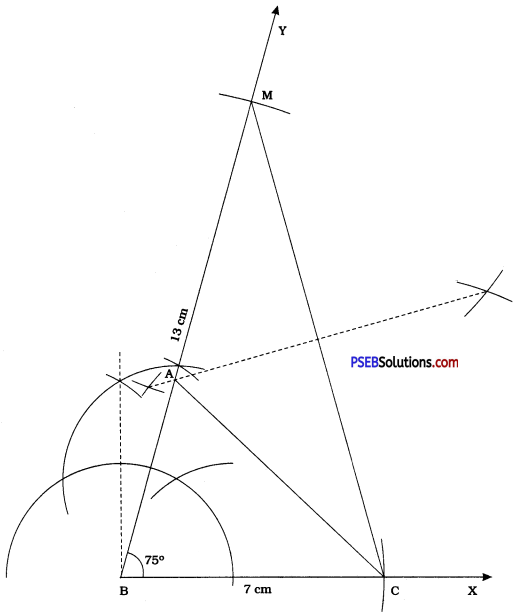
![]()
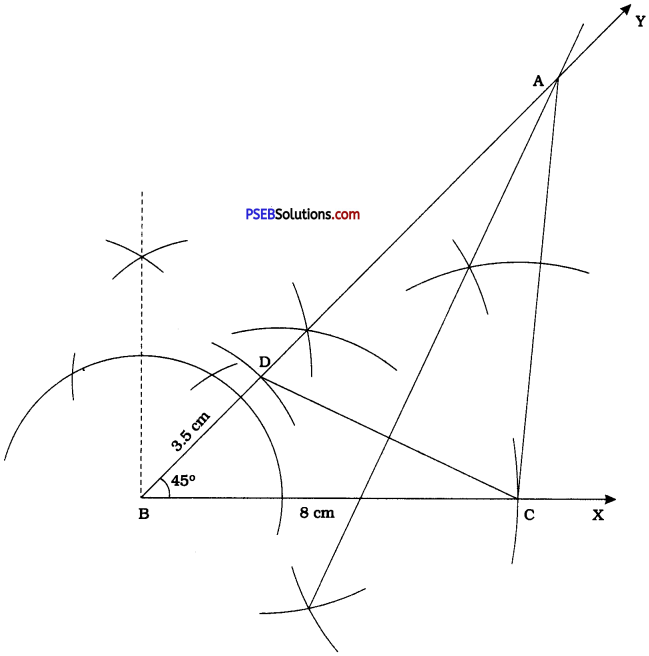
![]()
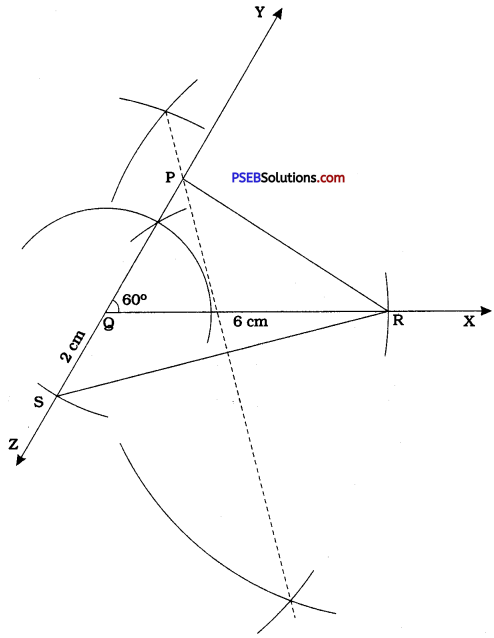
![]()
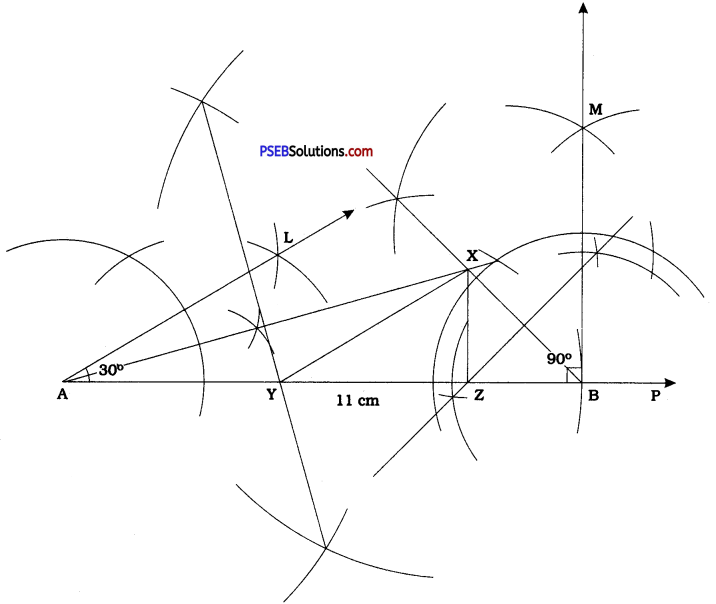
![]()
